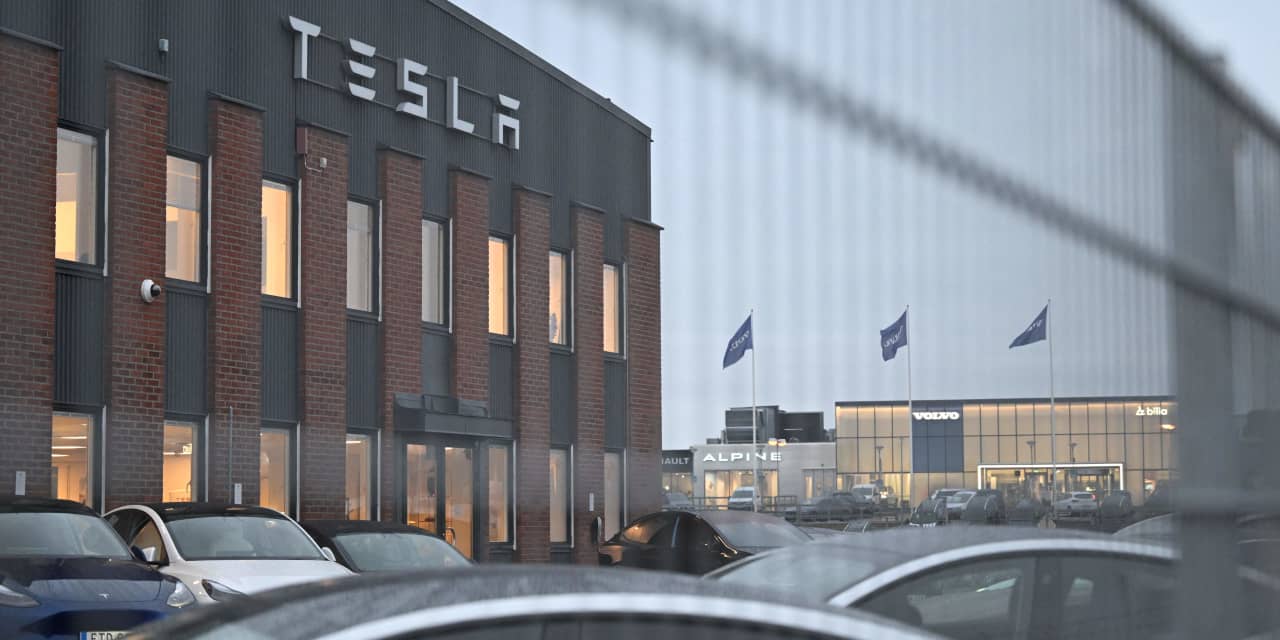Stock in
Tesla,
and other auto makers, dropped Monday. A disappointing forecast from the automotive chip maker
ON Semiconductor
appeared to be the proximate cause.
ON Semi (ticker: ON) reported its third-quarter financial results, with sales of $2.18 billion, compared with the $2.15 billion analysts had expected. The problem is that management said fourth-quarter sales will be about $2 billion, falling short of the $2.2 billion Wall Street had penciled in.
ON stock fell 22% Monday while the
S&P 500
and
Nasdaq Composite
both rose 1.2%.
Tesla (TSLA) shares dropped 4.8%, finishing below $200 at $197.36 apiece.
Rivian Automotive
stock (RIVN) lost 1.8%.
Ford Motor
(F) shares dropped 1.9%.
General Motors
(GM) shares gained 0.5% after the company and United Auto Workers Union came to a tentative labor agreement on Monday.
ON’s results are hitting auto stocks because they imply EV sales are slowing. ON makes products that manage power, which, of course, is key in a battery-powered car.
“Every new EV being built is going to have almost 14 times more content just on the [traditional] drivetrain,” said ON CEO Hassane El-Khoury at a September investor conference.
Investors might wonder if ON’s forecasts represent a chicken or an egg. Auto companies have been warning of weak EV demand for weeks, so it is possible that the chip maker’s cautious call is the result.
Ford and GM both recently deferred tens of billions of dollars of investments in EV production, citing the economy and moderating EV demand.
Volkswagen
(VOW.Germany) warned last week that orders for EVs were slowing. And Tesla stock fell 9.3% after CEO Elon Musk lamented how high interest rates were hurting demand as the company reported its third-quarter numbers.
EV sales around the world still growing. Sales so far this year are up roughly 30% to 40% compared with this time in 2022. But while growth a year ago was closer to 50%, it now looks as it the rate of increase could slip to 20% to 25%.
It is beside the point whether ON’s downbeat call is a function of the warnings from the auto makers, or ON’s forecast signals more pain ahead for EV sales. Investors are worried.
“Expect the correction in autos to worsen and play out over the next six months,” wrote New Street Research analyst Pierre Ferragu in a Monday report following ON’s earnings results.
Japanese EV battery maker
Panasonic
(6752.Japan) wasn’t helping things for EV stocks either. Monday, the company revised its fiscal year 2024 sales forecast to about ¥8.4 trillion yen, or about $56 billion, from a prior forecast of about $57 billion. Shares fell 2% in overseas trading.
The sales forecast for the company’s energy division, which includes batteries and other products, was cut by about 15% to about $5.9 billion.
Panasonic
blamed weakening demand for “high-end EVs” as well as weak consumer and industrial demand.
High-end EVs typically have more expensive batteries. Auto makers, including Tesla, have been shifting to lower-priced batteries to save costs, which is compounding Panasonic’s problem.
Panasonic’s energy business accounts for about 10% of the company’s sales.
What could turn things around? While lower interest rates would help, making all cars more affordable, the Federal Reserve doesn’t seem inclined to cut borrowing costs soon.
But a change to government incentives meant to aid the industry will take effect next year. The $7,500 purchase-tax credit now available to buyers of qualified EVs will come off the price of the car at the dealership starting in 2024. Buyers won’t have to wait for their tax return to see that benefit.
Through Monday trading, Tesla stock was down about 13% over the past 12 months, while Rivian shares had fallen about 55%. The S&P 500 was up about 8%.
Write to Al Root at [email protected]
Read the full article here




